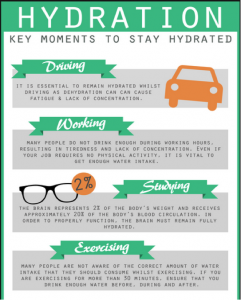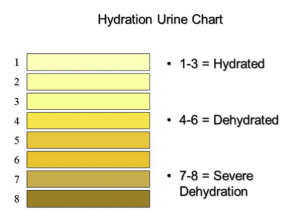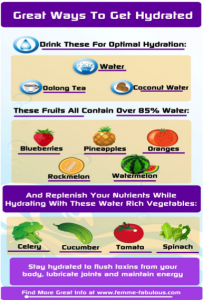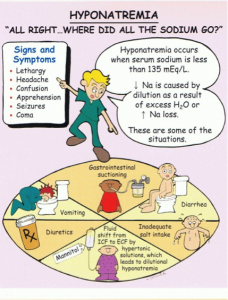Water is perhaps one of the most important sources for good nutrition; however, it is always overlooked. Staying hydrated is extremely important for daily functioning; in fact, many studies found that even mild dehydration impaired one’s cognitive functioning such as concentration, alertness, and short-term memory.
The phenomenon of dehydration is often misunderstood. True dehydration occurs when one loses at least 1% of his/her body water (eg. 60 kg x 0.01 = 0.6 kg loss of water). Thus, the loss of body water is relative to body mass. This loss of water can be attributed to many factors, such as breathing or sweating. In addition, dehydration during exercise is often linked with hyperthermia, a failure of the body’s thermoregulation system (AKA being too hot for your own good!).
Water requirement depends many factors: environment, age, gender, body composition and physical activity level.
- A typical requirement for an average healthy woman is ~2 L/day.
- The requirement for an average healthy male is usually ~2.5L/day.
Exercise or strenuous activity can increase these values even more to a point where water is consumed upwards of 5-9 L/day for elite athletes. For athletes or people exercising, it is important to hydrate before, during and after exercise. Usually before exercise, one should consume at least 250 mL of water. During exercise, one should consume between 150-250 mL of water every 15 minutes. After exercise, ~500 mL total should be consumed in small and spaced out amounts (portions of 150-200 mL).
A couple of good and convenient ways to monitor your hydration level is first, by monitoring your thirst. When you’re thirsty, simply drink enough to quench your thirst! Second, ensure proper hydration is maintained by monitoring your urine colour. Don’t just drain it, study it too!
Different types of environment cause a fluctuation in the proper hydration values across all areas. When accounting for the environment during hydration, further subcategories like temperature, humidity and altitude can manipulate water requirement values.
A hot or humid climate may raise body temperature and increase sweating capacity, thus increasing water intake requirements. In contrast, working in a cold climate can cause unexpected sweating if the clothing worn is impermeable or if an individual has been working in the cold for several hours. So, it’s not a good idea to bundle up too much in cold weather. Rather, it is more important to stay hydrated in both hot and cold climates.
Increases in water loss are also directly related to an increase in altitude. As one gets higher in altitude, the air becomes drier, thus stimulating hyperventilation (an increase in breathing). As you may recall from earlier, breathing elevates respiratory water loss and causes eventual dehydration. These factors depict that people living at higher altitude need even more water than those living at sea level.
Other than the environment, different aspects of food ingestion can also affect hydration. The ingestion of high glucose (sugar), high fat content, or alcoholic beverages can all slow down water absorption, thus leading to an eventual shortage of water in the body. If the water requirement is not met immediately when the shortage happens, dehydration will occur. These factors show that it may not be a good idea to drink a lot of pop, or eat a lot of fatty foods without consuming more water afterwards!
The majority of water intake that one takes in can come from fluids. Other water sources can also be from ingesting solid food, such as fruits and vegetables, or through metabolism, in the form of chemical reactions in the body that occur at the cellular level.
The importance of hydration is obvious and necessary; however, it is also just as important not to over-consume water. In fact, overconsumption of water is known as hyponatremia (aka “water intoxication”), and can be lethal and even cause death (due to swelling of the brain). Hyponatremia occurs when one drinks liters upon liters of water in a short period of time (eg. >10 L of water/day). The over-consumption of water eventually leads to cell swelling and hampers our kidneys’ ability to filter water effectively, as well as maintain a proper sodium balance. In a sense, you’re drinking more water than your kidneys can extract out through urine! This condition is rare for average sedentary adults, but is more prevalent in distance or endurance runners.
It is mandatory that we stay hydrated during daily activity, and especially during exercise. However, it is also important to obey our body’s natural warning signs. When we feel thirsty, it becomes necessary to drink water and quench that thirst. If we begin pushing our water consumption beyond our body’s point of comfort and experience minor symptoms listed above, it’s an indication to stop drinking.
4 Simple Tips to Ensure Hydration:
- Monitor your urine colour constantly
- Drink at least 250 mL of water before, during, and after an exercise bout
- Eat at least 3 fruits or vegetables that are high in water content per day
- Whenever you sweat, make sure you drink water immediately
References:
Ritz, P. & Berrut, G. (2005). The importance of good hydration for day-to-day health. Nutrition Reviews, 63(6), 6-13.
Shirreffs, S.M. (2005). The importance of good hydration for work and exercise performance. Nutrition Reviews, 63(6), 14-21.
Will Le BScKin Student




